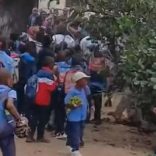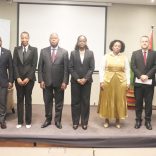Mozambique News Agency Director-General Jordão Muvale passes away aged 56
Every day, Bacar looks for someone to breastfeed his granddaughter

FILE PHOTO - For illustration purposes only. [File photo: Lusa]
Bacar Aine, displaced by war in Cabo Delgado, has lost his daughter and is now unable to feed his seven-month-old granddaughter.
Displaced by war in Cabo Delgado, northern Mozambique, 67-year-old Bacar Aine has lost a daughter and is now unable to feed his granddaughter, a seven-month-old baby, in a humanitarian crisis where aid remains underfunded.
Bacar’s other grandchildren follow the example of adults and, when nothing better presents itself, “eat leaves” ground up and made into a broth over a fire in the 3 de Fevereiro IDP reception camp in Murrebué, Mecufi district, on the Cabo Delgado coast.
Dozens of families there have left their land in search of safety, free from insurgent groups. But the humanitarian aid they receive is rarely enough to overcome hunger, Bacar says.
The seven-month-old baby needs to be breastfed and the grandfather has been seeking help from other mothers in the camp. “I go around the families where maybe someone can breastfeed her,” he says, distressed by his lack of alternatives.
“What can I do with the children? Or should they all die like their mother did? Because it’s very difficult to get food,” he cries, not knowing where to start.
Lusa tried to obtain clarification from the United Nations Children’s Fund (Unicef) in Cabo Delgado about this type of situation, but received no response.
What is known is that World Food Program (WFP) lacks funds to satisfy the hunger of the approximately one million people who need food in Cabo Delgado alone, according to the latest data from the agency.
The deficit is around 5% to 20% of the needs, with the prospect of that worsening after March, after which the WFP is guaranteed only a fifth of its current financial support.
“Due to limited resources, WFP has, since July, 2021, provided bi-monthly baskets equivalent to 39% of daily energy needs,” the agency explains.
Local authorities say they are doing what they can, but they are dependent on international partners.
“I’m asking for help, to save these children,” Bacar sums up.
The grandfather’s martyrdom began in 2020, when he and his family had to flee the house where they lived in Quiterajo, Macomia district, because of armed attacks by insurgent groups.
He, his wife, five children and grandchildren spent months on the run through the bush until they reached the provincial capital, Pemba, but difficulties in accessing food forced them to move still further on.
They settled at the 3 de Fevereiro resettlement centre in Murrebué, 35 kilometres south of Pemba, but their flight had already weakened everyone’s health.
Bacar’s eldest daughter became ill and died in September, 2021, leaving five children, including a seven-month-old baby girl.
It is estimated that around half the 800,000 displaced people in northern Mozambique are children and young people, reflecting the country’s age structure and the fact that mothers have, on average, five children.
Cabo Delgado province is rich in natural gas, but has been terrorised since 2017 by armed rebels, with some attacks claimed by the Islamic State extremist group.
Since July, an offensive by government troops with the support of Rwanda, which was later joined by the Southern African Development Community (SADC) has increased security, recovering several areas where there was a presence of rebels, but localized clashes persist.











Leave a Reply
Be the First to Comment!
You must be logged in to post a comment.
You must be logged in to post a comment.